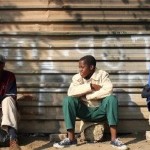Steely Resiliance: Youth Unemployment in Guinea
By Nathalie Sheppe
I’ve spent the last three weeks preparing and conducting an evaluation of Barada, one of Search Guinea’s mainstay radio programs. I’ve been working so closely with the program that I almost lost sight of what the word “Barada” actually means. It means teapot. In Guinea, tea drinking is a social staple of the young. Throughout the day and into the night, groups of youths sit around a simmering teapot gossiping, analyzing, and even at times arguing. There are several topics of discussion but politics is a perennial favorite. While no one can question the value of healthy debate, the practice’s pervasiveness speaks to a more sober reality– one which involves high levels of unemployment amongst Guinean youth. Youth unemployment is a major problem in West Africa. According to a 2007 paper by the United Nations Industrial Development Organization (UNIDO), available data shows that in 2005, the economically active population among 15-19 year olds was 49% among women and 58% among men. The absolute levels of unemployment, when considered in conjunction with the effects of under-employment and poor working conditions, indicate that this age group faces severe economic adversity.
Yet despite the very real hardships that they confront, you’d be hard pressed to find a trace of defeatism in Guinean youths–Frustration yes, defeatism no. What keeps them from sundering? I’d say it’s a sense of personal responsibility for their own condition and well-being.
There’s plenty of evidence of this take-charge attitude. It can be seen in the university-educated night watchman who sits twelve-hour shifts in exchange for minimal wages so as to not “just do nothing.” I found it in the back alley of a residential neighborhood where a woman runs a “dye” business to complement her teacher’s salary. All up and down the country, I have met youths who have never failed to impress me with their resilience and determination. However, it wasn’t until last week that a youth I met in the Lambanye neighborhood put into words what I’d seen.
As part of my evaluation, I had the opportunity to organize and sit in on three focus groups. In true “Barada” fashion, each of these took place in a private residence and brought together a group of youth for an informal conversation on how to improve the Barada radio program. The conversation quickly turned to youth unemployment. However, this was no pity party. Youth unemployment is a problem but given the current state of development in Guinea, the participants acknowledged that it was unlikely that the situation would rectify itself in the short run. But that wasn’t any reason or excuse for inaction. Instead the youths called on one another to take charge. Launch a small business, join a youth cooperative, the suggestions were forthcoming and they were numerous. The message was clear. While the government may be a key partner in the race to end unemployment, the imperative for action lies squarely on the shoulders of the young. Given the marginalization to which the young have been subjected, you’d almost forgive a certain degree of passivity. But there is none of that here. In the words of the youth themselves: “Just because I went to school doesn’t mean I necessarily end up in an office and just because I am illiterate doesn’t mean that I will end up in the streets. We have to take charge of ourselves and support one another. Formal sector opportunities don’t exist but we can start small businesses.” There have been bumps in the past and willingness doesn’t always ensure a way, but the tenacity of Guinean youths is really something to behold.
###
Nathalie Sheppe is an international intern in SFCG’s Guinea office. Find out what else we’re doing in Guinea!










Thankfully some bloggers can write. My thanks for this read!!